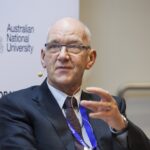Land of the unexpected

In mid-February, rather than wait for a vote of no confidence, Marape arranged for a sudden vote of confidence in the parliament. The opposition boycotted the vote allowing Marape to win 84-0 in the 118-seat parliament. The opposition had earlier filed a motion for a vote of no confidence, but the government outmaneuvered it.
A few days later, a tribal war broke out in Enga and in the Upper Highlands. More than 50 people were killed in an ambush. High powered weapons were involved. Again, it was alleged that the police did not intervene even though this was a long-standing tribal conflict. Besides being outgunned, it is almost certain that political leaders were involved indirectly in the tribal conflict. A state of emergency was declared, and it took almost a month of negotiations before a ceasefire agreement was signed in Port Moresby on 13 March. Cynics argue that while this ceasefire may hold, it does not address the underlying causes of the conflict and both sides will resume the fighting at a later date. Since independence, no PNG government has been able to “tame” Enga or much of the Highlands.
While many are worried that these recent incidents indicate the start of another cycle of intense instability in PNG politics, I would argue what we are seeing is the start of the downfall of James Marape, the incumbent prime minister since 2019. Marape has survived much longer than expected, surviving a no confidence vote in 2019. Despite this, his party won the largest number of seats in the 2022 general elections, and he was re-elected PM unopposed.
Marape looks good for now, but in all likelihood, he will be deposed before the year is out. PNG politics is always unpredictable but one consistency is the role of money in buying supporters. Once this is gone, the fall of the government is likely. Marape’s government is cash rich primarily because of the untied grants from the Australian government, however all the other sectors of the economy are doing badly.
The January rioting has caused the business community to lose faith in Marape’s ability to control the various political warlords. If Marape cannot find the money to rebuild the economy, the withdrawal of support from the business community will be his Achilles heel. Thus far, Marape is only willing to offer loans to rebuild but the business community wants grants since they cannot realistically repay the massive loans.
For the time being, the Australians are the only ones with the money, and if additional cash is not injected into the PNG economy, an economic downtown may occur in the second half of the year. This will almost certainly mean another vote of no confidence.
The wild card in all of this is of course the Chinese. Thus far the Chinese have largely stayed out of the leadership tussle, trying rather to forge influence with both sides. The Chinese have kept a fairly low profile in the past few months, although it is known that many Chinese traders were affected by the rioting. The biggest problem for them is Marape’s impulsiveness. They thought they were close to a security deal with PNG until he hinted that he would not proceed because of strong public backlash.
The Chinese are also keeping a low profile because they do not want anything in the news. The Chinese are concentrating on Solomons Islands, which is heading for a general election on 17 April. Prime Minister Manasseh Sogavare has made it clear that he is a friend of Beijing while his opponents are widely seen to be pro-Australia, and perhaps pro-Taiwan. Beijing wants Sogavare to win, and therefore they will not create unnecessary negative news.
Prolonged concentrated political instability in PNG usually leads to a change of prime minister. The current system concentrates power in the hands of the PM and thus, when things go drastically wrong, the instinct is to bring in a new person.
There is no lack of candidates trying to be prime minister, including Peter O’Neill, the man Marape replaced. Given the parliament floor horse-trading tradition, it will probably be a dark horse or someone who pulls together a majority at the last minute. They don’t call PNG the land of the unexpected for no reason.
This article was published by the Australian Institute of International Affairs.
James Chin is a Professor of Asian Studies at the University of Tasmania where he focuses on governance issues in Malaysia, Brunei and Singapore.













